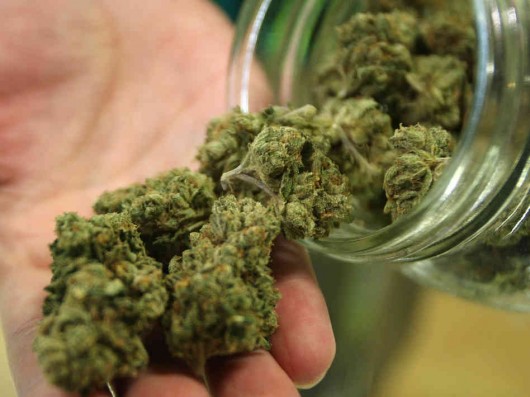Ketchikan’s joint city and borough Cooperative Relations Committee listened Friday to presentations and public comment about whether and how to allow commercial marijuana operations in Ketchikan.
Like in many communities throughout Alaska, Ketchikan officials are grappling with how to respond to last fall’s vote in favor of marijuana legalization.
The lunchtime meeting started with a presentation from Ketchikan Gateway Borough Planning Director Chris French, who recently attended a conference in Colorado that focused on marijuana legalization. Among the topics he addressed in his presentation was the black market, which French said has continued in Colorado even after legalization went into effect.
“The issue in Colorado is because, the type of marijuana they’re growing and how much it’s worth makes a market for less costly marijuana at lower THC levels that primarily come through the black market,” he said. “So that’s why it still exists there, it’s just a different market than it was prior to legalization.”
Terrance Robbins from the Ketchikan Wellness Coalition spoke in favor of banning commercial marijuana operations in Ketchikan. He said the community needs to consider the effect of pot use on the brain development of Ketchikan’s youth, and those kids already have access to pot now.
“Imagine a situation where they can send their buyer to the store to go purchase some weed for the party, which is what happens in alcohol parties,” he said. “Of the kids who reported drinking in the last 30 days, 40 percent of them had someone go to the store to buy it for them. If we had a store where a 21-year-old could go buy marijuana for the kids, it’s going to be that much easier.”
Matt Eisenhower, who works for PeaceHealth Ketchikan Medical Center, focused on a different demographic. He said there is increasing interest in, and evidence of, the benefits of medical marijuana. Eisenhower said patients who could benefit from pot should be able to buy it legally.
“The medical center recognizes that if a patient chooses this course of treatment for their clinical care, a safe and well-regulated industry is important,” he said. “That they can have precise and untainted medicine would be in their best interest.”
Jackie Williams spoke up for responsible adults who want to imbibe. She said not everyone can or wants to grow it in their own homes. For example: apartment residents whose landlords have chosen to prohibit marijuana cultivation for personal use.
Williams added that it would be safer for adults with families to buy small amounts for limited use, rather than grow marijuana plants in a home with children.
“I don’t want to grow marijuana in my house. I don’t want it around all the time. I don’t want my house stinking, I don’t want children that may come visit having access to it or smelling it or breathing it,” she said. “I would much rather go down to a legal dispensary, who shows that not all their marijuana is not way high, high, high concentrates.”
Personal cultivation and use of marijuana becomes legal statewide on Feb. 24. Retail operations won’t be legal anywhere in Alaska until after the state has come up with regulations for that industry. Local communities can opt out of allowing marijuana businesses.
Overall, six people spoke in favor of allowing commercial pot operations, and one other speaker wanted to make sure the police department’s drug dog would still be used at the high school. There were more in the audience who didn’t have an opportunity to speak because the meeting was scheduled for just one hour.
Cooperative Relations Committee members themselves didn’t have time to discuss the topic, so it likely will come up again at a future meeting, and because of the clear public interest, Borough Assembly Member Bill Rotecki suggested an additional hearing so more people can provide input.






